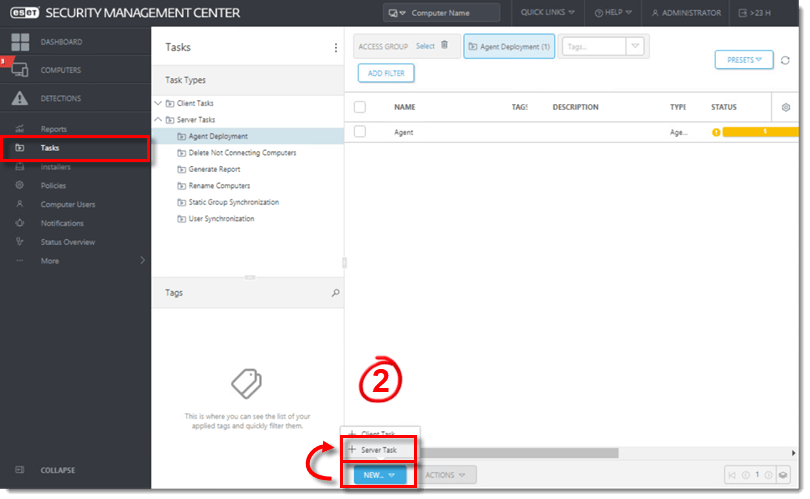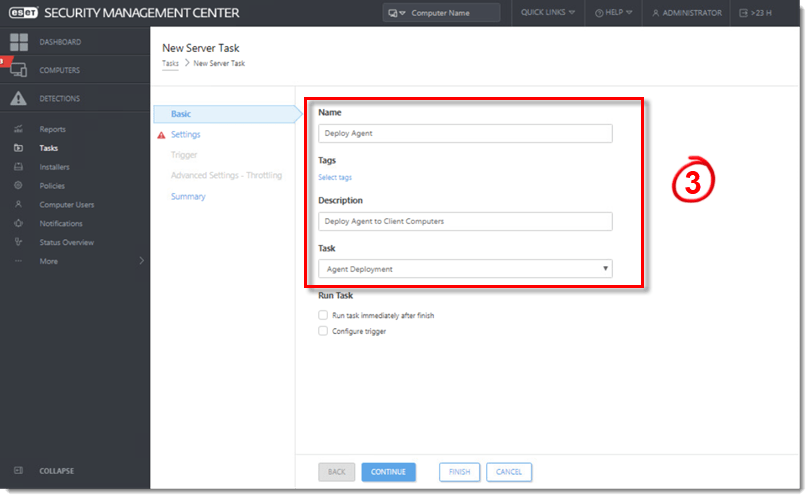Issue
- Install the ESET Management Agent to client workstations remotely using the ESET Security Management Center (ESMC) Web Console
- Reinstall the ESET Management Agent to orphaned or disconnected client workstations using the ESMC Web Console
- A client workstation was orphaned or disconnected because it was pointed at an absent or incorrect server
Solution
Getting Started with ESMC: Step 4 of 6
← Add Client Computers | Deploy ESET endpoint solutions →
To install or reinstall client workstations to ESMC Server, follow the steps below:
- Open ESET Security Management Center Web Console (ESMC Web Console) in your web browser and log in.
- Click Tasks → New → Server Task.

Figure 1-1
- Type a Name and optional Description for your task. Select Agent Deployment from the Task drop-down menu.

Figure 1-2
Click the image to view larger in new window
Click Settings, and configure the settings listed below to your preference (fields marked with a * are mandatory). Click ESMC Certificate and verify the correct certificate created during installation is selected and then click Finish.
-
- Automatic resolution of suitable agent—If you have multiple operating systems (Windows, Linux, macOS) in your network, select this option and this task will automatically run the appropriate server-compatible Agent installation package for each system. To choose a package manually, deselect Automatic resolution of suitable agent and then choose the package you want to use from the list of available Agents in ESMC repository.
-
- * Targets — Select the clients that will receive this task. Click Targets, navigate to the group the target client workstations belong to, select the target clients and then click OK.
-
- * Username/Password — The Username and Password fields are for the user with sufficient rights to perform a remote agent installation (not your ESET-issued Username). The username should be typed in the following format: %domainname%\AdminUsername.
-
- Server hostname — Enter a server hostname if the client hostname differs from that of the server. Alternatively, you can enter the IP address if you are having hostname resolution issues.
-
- * Peer certificate/ESMC certificate — This is the security certificate and certificate authority for the agent installation. You can select the default certificate and certificate authority, or use custom certificates.
-
- Custom certificate — If you use a custom certificate for authentication, navigate to that certificate and select it when installing the Agent.
-
- Certificate passphrase — Optionally, you can create a password for the certificate. If you apply a password for a certificate, users will be required to enter it before they can install ESET Management Agent using that certificate.
- Deselect the check box Participate in product improvement program if you do not agree to send crash reports and telemetry data to ESET. If the check box is left selected, telemetry data and crash reports will be sent to ESET.
Click the Summary section to review your configured settings.
Repeat the Agent deployment task to apply your new certificate to the ESET Management Agents on client computers.
If you are performing a new installation of ESMC, proceed to Step 5, deploy ESET endpoint products to your client computers.

